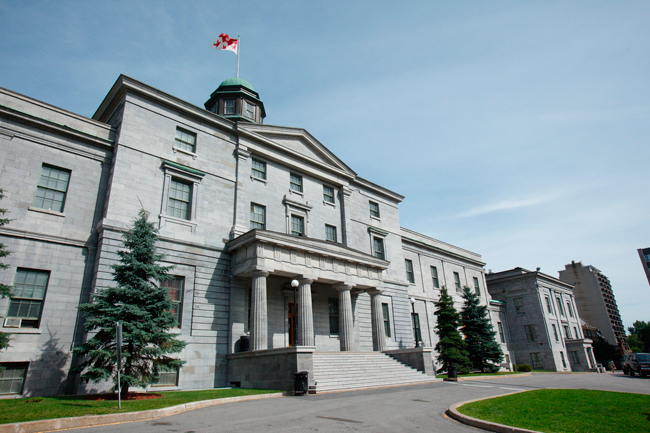
By Mark Ordonselli
While McGill’s cost-cutting measures will remain in place, staff salary commitments will be honoured and work will soon begin to modernize McGill’s buildings and IT infrastructure, Provost Anthony C. Masi told Senate in his annual budget presentation on April 22.
Until a few weeks ago, McGill was projecting a $7-million deficit in FY2014-15, due mostly to the $20 million in cuts imposed by the Quebec government last fall. But in March, the government re-assessed the number of full-time-equivalent McGill students counted in previous years. “They admitted that they owed us more money,” Masi said, and transferred some $12.2 million to McGill.
Thanks largely to that cash infusion, McGill will post a modest $4.3-million surplus for FY2014-15 – around 0.6 per cent of McGill’s operating budget. Masi warned, however, that “this is not a hard number, because we still haven’t arrived at year-end, and because there will be expenses in the month of April that will see that number go down – if not to zero then maybe into negative territory.”
If, when all expenses are accounted for, McGill does indeed complete FY2014-15 with a surplus, it will be automatically used to help pay down the university’s accumulated deficit, which currently hovers just below $100 million.
Masi made a similar presentation to the Board of Governors on April 28, following which the Board approved the proposed budget.
Masi told Senate that the current fiscal year, which ends on April 30, was “the third year in which we’ve had major cuts, and we’re anticipating more for next year.” The new Quebec budget, tabled March 26, included some $70 million of new cuts to Quebec’s university network for FY2015-16. Of that amount, McGill expects its share to be approximately $11 million.
Despite the difficult financial environment, Masi noted that McGill will honour all its salary policy commitments for FY2015-16, at a cost of $22 million. As well, the university will begin tackling an estimated $1 billion-plus in deferred maintenance needs, to update its buildings and IT infrastructure.
The hope is that some of this deferred maintenance work will be supported by donors and government grants, but it will also require $400 million in loans, to be repaid over some 40 years. Masi maintained that despite the expense, the need for more modern labs and classrooms, better digital networks, more efficient heating systems and other infrastructure has become critical. “Deferred maintenance,” he said, “can no longer be deferred.”
Masi also announced more money for student aid in each of the next five years, with the total annual aid budget expected to reach $31.9 million by FY2019-20.
Speaking of the FY2015-16 fiscal year, Masi said, “this is the first time in a decade that we’re thinking that this year’s amount will be less than last year’s – slightly, but it’s going down.”
As a result, he said, the cost-cutting measures already in place will be maintained through the coming fiscal year and possibly beyond. They include:
- A freeze on external hires for administrative and support staff positions
- The central recuperation of salaries liberated when employees leave their positions
- The suspension of overtime payments, except for essential work
- A re-design of the policy and practices governing job re-classifications
- Changes to the policy governing how units’ budget surpluses carry forward from year to year
- Cuts to units’ budgets: a 3-per-cent average cut for administrative units (based on FY2013-14 budgets), and a 2-per-cent average cut for faculties
Even with these measures in place, Masi projected a $4.7-million deficit for FY2015-16.
“We’ve managed well, but every unit has to make some sacrifices in order for us to meet our objectives,” he said. “Every time we decide not to cut from one unit, we’re asking another unit to pick up the slack. Everything we do is a trade-off.”
McGill will explore other ways of cutting costs as well, like lobbying to ease provincial reporting requirements. It’s estimated that McGill spends more than $1 million each year “just filling out forms for the Quebec government.”
Discussing the university funding situation in Quebec, Masi insisted that the provincial government must either reinvest in universities, or allow them greater flexibility in finding alternative revenue streams.
“I hope no one thinks that prolonged austerity is the road to prosperity,” Masi said. “At some point, reinvestments will have to be made. You cannot continue austerity measures and hope that this is somehow going to lead to a brighter future. It won’t.”
Read Provost Masi’s McGill University Budget FY2016 presentation to Senate
Read more budget-related stories
